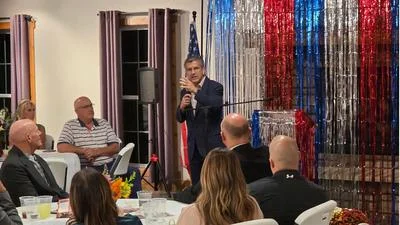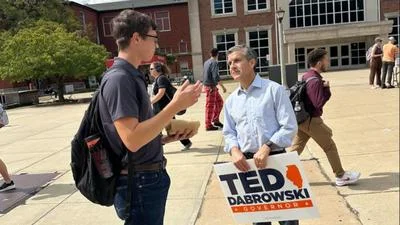Chicago Police | File Photo
Chicago Police | File Photo
Should Chicago defund its police department?
Hal Butler is willing to consider it, with a new form of law enforcement being created that he thinks would be superior.
“Yes, because public demands it,” said Butler, 55, a Republican precinct committeeman from Eldorado.

Hal Butler
| LinkedIn
Does it have any real chance?
“Yes, because public demands it,” he told SE Illinois News.
As public outrage over the death of George Floyd while in custody by the Minneapolis Police Department — four officers were fired and criminally charged in his death — calls for defunding or reducing funding for police departments have grown.
Politicians and the public in New York City, Los Angeles, Chicago, Minneapolis and other cities have entered the conversation.
Chris DesRoches, president of the neighborhood association in Kingfield, a neighborhood in South Minneapolis, told The New York Times it is a concept worth exploring.
“The killing of George Floyd has opened the eyes of people to the worst case scenario of police,” he said.
DesRoches said it was time “for white people to start hearing what communities of color and community leaders have been saying all along, which is that the police are an organization which has been actively harmful to our communities.”
Butler still wants law enforcement in Chicago and other large cities. With police departments no longer a public entity, another kind will arise, he said — “eventual privatization of police in metro areas.”
Butler said it’s an idea well worth exploring.
“Decertify union representation for all federal, state and municipal employees,” he said. “Unions need to stop protecting bad apples, and end union’s political influence.”
The Chicago Police Department has an annual budget of around $1 billion, making up 40 percent of the city’s budget. Some critics are wondering if the money could be spent in different ways, such as rent relief, mental health clinics, COVID-19 testing and providing personal protective equipment to health-care workers.
A rally in Union Park Friday drew hundreds of people calling for the Chicago Police to be defunded and demilitarized, and stop overseeing public protests over police misconduct and racism. Speakers also said the National Guard should stand down.
As the protesters moved from the park through the Near West Side and West Town, police officers accompanied them. No incidents were reported.
Chicago Mayor Lori Lightfoot said she does not support disbanding the Police Department, but she will hold police officers to a high standard.
“Since the onset of these events, Mayor Lightfoot and Superintendent [David] Brown have been unequivocally resolute that police misconduct of any kind will not be tolerated and those found committing wrongdoing will be held fully accountable,” her office said in a statement. “Just as the overwhelming majority of protests remained peaceful this week, the vast majority of officers followed their training and supervisor direction during these difficult times. Nonetheless, we will continue to vigorously investigate all reports of excessive force arising from this week.”
Lightfoot was appointed president of the Chicago Police Board in 2015. She led the Chicago Police Accountability Task Force, which released a report in 2016 citing “racism and systemic failures in the city's police force, validating complaints made for years by African-American residents.”
Mayor Rahm Emanuel said one-third of the panel’s recommendations would be imposed.
Butler is self-employed and works in information technology. His experiences with the Chicago Police Department have been interesting but safe.
“Was driving the speed limit and was pulled over on I-57 and given verbal warning about disrupting the flow of traffic and it was safer to speed up and match the flow of traffic,” he said.
“Missed a detour sign and was lost somewhere on the south side, was pulled over, officers explained that a ‘white boy’ shouldn’t be in this area, escorted me back to the highway and gave directions,” he said.





 Alerts Sign-up
Alerts Sign-up